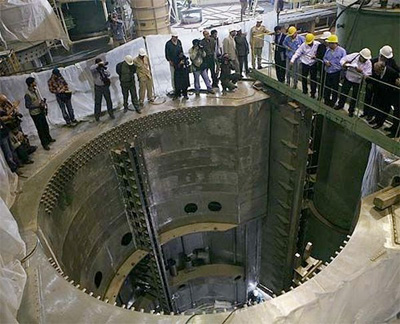
The Obama administration is preparing the ground for tougher sanctions on Iran by pushing to revive last year’s ill-fated fuel swap deal. The renewed proposal to swap Iran’s low enriched uranium for research reactor fuel is not a serious attempt at engagement, as the Unites States knows it will likely fail. Instead, it is intended to depict the United States as a reasonable negotiating partner, and Iran as a duplicitous state bent on obtaining the bomb at all costs. This could increase support for harsher international sanctions that are more strictly implemented.
The original fuel swap proposal of October 2009 showed promise. At the time, Iran’s stocks of uranium were enriched to 3.5 percent. It claimed it needed enrichment to 20 percent to produce medical isotopes in its Tehran research reactor. However, once uranium is at 20 percent enrichment, it is not too difficult to increase it to the 90 percent required for weapons. Accordingly, the P5+1 (China, France, Russia, the United Kingdom, the United States, and Germany) is concerned Iran’s enrichment program is a mask for its weapons ambitions.
Under the fuel swap plan, Iran would have shipped 1,200 kilograms of its 3.5 percent enriched uranium to Russia for enrichment to 20 percent. Then, France would have fabricated the enriched uranium into fuel rods for Iran’s reactor, which could not have been used for weapons purposes. Shipping the uranium out of Iran would have made it difficult for Iran to rapidly create enough fuel for a weapon, and the swap would obviate Iran’s need to enrich to 20 percent. The aim was to halt Iran’s progression towards potential weapons-grade material, and allow time for discussions on Iran’s program, including on enrichment suspension.
While Iranian president Mahmoud Ahmadinejad indicated the deal might be acceptable, Supreme Leader Ayatollah Khamenei ultimately rejected it — a sign of Iran’s complicated internal dynamics. The P5+1 rebuffed Turkish and Brazilian attempts to broker a deal in May of this year, in part because it would have left Iran with enough fuel to further enrich for a weapon – a fundamental reason for the fuel swap in the first place. Instead, in June, the UN Security Council implemented its toughest round of sanctions, and many states adopted more thorough unilateral sanctions. While these sanctions hurt, they have not compelled Iran to stop enrichment, nor fully cooperate with the IAEA. In the absence of any agreement, Iran has forged ahead, producing an estimated 33kg enriched to almost 20 percent. Roughly twice that amount more would be enough to further enrich for a bomb.
If the new fuel swap deal is a serious attempt at engaging Iran, it is doomed to fail. It will fall prey to the same dynamics that precluded a deal the first time around. Iran has flatly rejected shipping significantly more than 1,200kg of 3.5 percent fuel abroad to account for its enrichment since the original proposal — a key element of the Administration’s new terms. Moreover, Iranian leaders have turned Iran’s right to enrich uranium into a matter of national pride, and it is highly unlikely that they will agree to a deal that moves them closer to enrichment suspension negotiations. Both Khamenei and the parliament have sent clear messages to this effect.
The timing is not ripe for such a deal, and the Obama administration cannot be blind to this reality. It is reviving the deal as part of a broader strategy to strengthen support for sanctions implementation, and to further isolate Iran. For an administration that believes in the power of sanctions, they are not as harsh as they could be. Russia and China watered them down in the Security Council, and the United States is disappointed by the less-than-rigorous application by some, most notably Turkey. The more Iran is seen to reject a reasonable deal, the more its peaceful intentions appear questionable. Then, the United States can then push for more thorough and sustained sanctions, with the eventual goal of bringing Iran back to the table.
Whether or not the sanctions will compel Iran to negotiate remains to be seen. But its uranium enrichment program is suffering substantial technical setbacks, which gives time for sanctions and diplomacy to run their course. If the administration’s goal is to build support for harsher sanctions by making Iran appear recalcitrant, proposing a stillborn deal disguised as engagement is a shrewd approach.
First published in HuffingtonPost.com.
AUTHOR
Emma Belcher is Stanton Nuclear Security Fellow at the Council on Foreign Relations.






